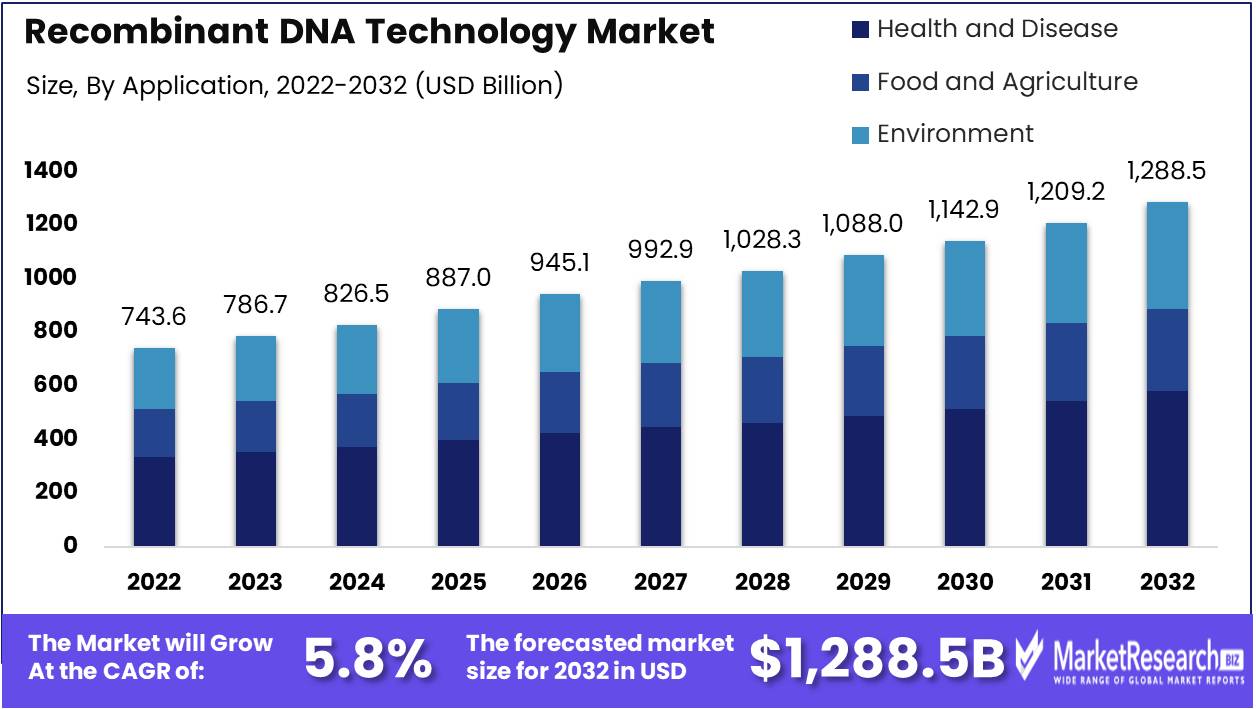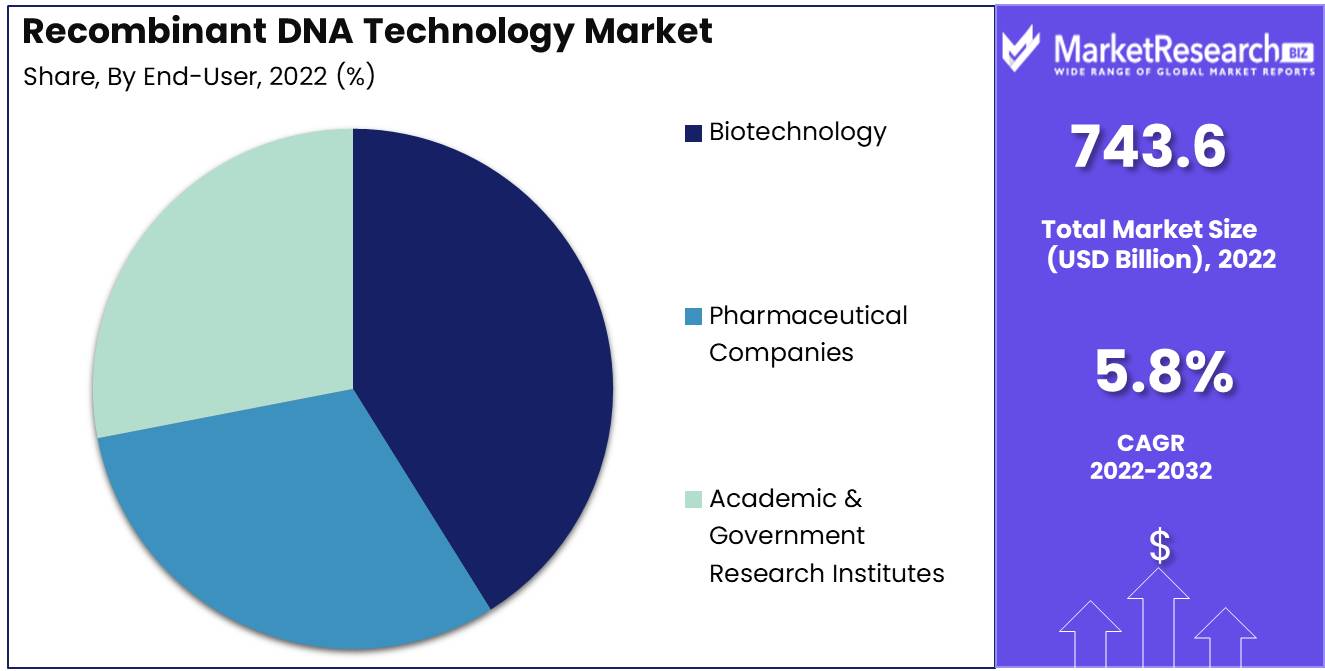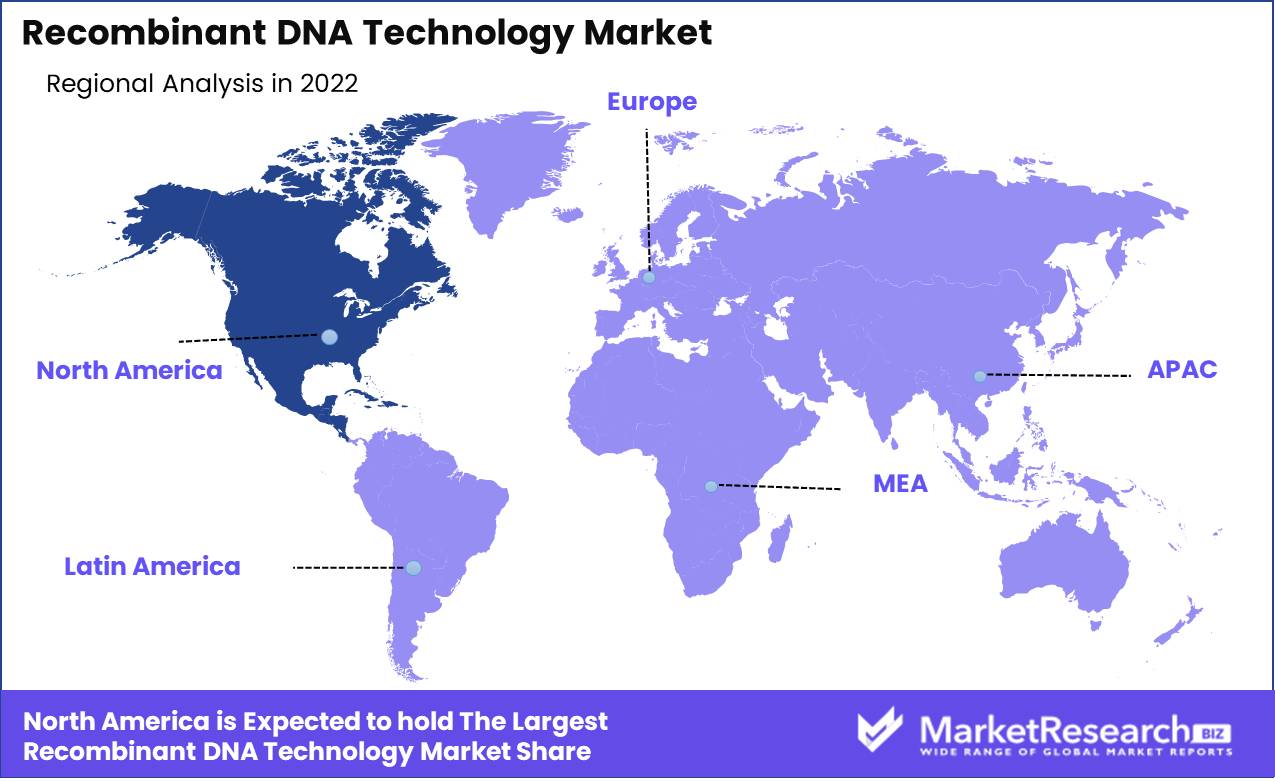
Recombinant DNA Technology Market By-Product(Medical, Therapeutic Agent, and Other), By Component(Expression System, Mammalian, and Other), By Application(Health And Disease, Food And Agriculture, Environment), By End-User(Biotechnology, Pharmaceutical Companies, and Other ), By Region And Companies - Industry Segment Outlook, Market Assessment, Competition Scenario, Trends, And Forecast 2023-2032
-
3884
-
Jul 2023
-
170
-
-
This report was compiled by Correspondence Linkedin | Detailed Market research Methodology Our methodology involves a mix of primary research, including interviews with leading mental health experts, and secondary research from reputable medical journals and databases. View Detailed Methodology Page
-
Report Overview
The Recombinant DNA Technology Market size is expected to be worth around USD 1288.5 Bn by 2032 from USD 743.6 Bn in 2022, growing at a CAGR of 5.8% during the forecast period from 2023 to 2032.
The Recombinant DNA Technology Market is an exceptionally dynamic and profitable sector within the biotechnology field. This report aims to shed light on the most recent developments, expansion, and future potential of this burgeoning market.

Recombinant DNA technology is a set of sophisticated laboratory techniques that permit the manipulation of DNA sequences and genomes. This technology gives scientists the ability to create novel genetic combinations, generate proteins with specific functions, and engineer organisms with desired characteristics. The goals of utilizing this technology are diverse, ranging from the production of new therapeutic medications to the creation of crops with the ability to resist parasites and diseases.
Recombinant DNA technology is acquiring prominence in a variety of fields, such as healthcare, agriculture, and environmental sciences. It has numerous advantages, including the production of human proteins and peptides, the generation of genetically modified crops that increase crop yields, and the production of more effective vaccines. Additionally, recombinant DNA technology has the potential to reduce the use of pesticides and herbicides in agriculture.
To improve the precision and efficacy of gene modification, research institutions, and businesses have made substantial investments in developing cutting-edge innovations such as CRISPR (Clustered Regularly Interspaced Short Palindromic Repeats) and gene editing. Increasing investments in biotechnology and recombinant DNA technology have resulted in the incorporation of these techniques into a variety of commercially available products, such as pharmaceuticals, vaccines, and genetically modified crops.
Driving factors
Growth Factors for Recombinant DNA Technology
Multiple influential variables are driving the rapid expansion of the recombinant DNA technology market. The ongoing technological advancements that stimulate innovation in the field are one of the primary drivers. Recombinant DNA technology is expanding beyond its traditional domains, such as medicine and pharmaceuticals, into diverse sectors such as agriculture and environmental monitoring.
Increased Interest in Personalised Medicine and Gene Drugs
In addition, the rising demand for personalized medicines and genetically engineered medications is a major factor propelling the expansion of the recombinant DNA technology market. In many cases, these medications are more efficacious and have fewer adverse effects than their conventional counterparts, thereby increasing demand in the healthcare industry. In addition, the increasing prevalence of chronic diseases and genetic disorders stimulates research and development efforts in the field of recombinant DNA technology.
Government Initiatives and Increased Healthcare Spending
Remarkably, rising healthcare costs and government initiatives to promote biotechnology research are also driving the expansion of the recombinant DNA technology market. Governments around the world recognize the potential of this technology and are investing heavily in its research and development. This encourages innovation and encourages the development of novel treatments and therapies. The Recombinant DNA Technology Market thrives on peptides, unlocking advancements in genetic engineering and biopharmaceuticals.
Restraining Factors
Opposition to Genetic Modification
As we progress as a society, the ethical ramifications of genetic modification and the opposition to it have gained prominence. This is especially true for the use of recombinant DNA technology, which has been met with an onslaught of regulatory obstacles and government policies that present significant obstacles to the field of study.
The potential benefits of gene modification are enormous, but the perceived risks associated with it have sparked opposition from diverse sectors of society. Religious groups, for example, view it as unethical and contrary to the natural order of things, while others query the morality of playing God and tampering with human existence.
Obstacles posed by regulations and government policies
The regulatory barriers and government policies that have resulted from these concerns only serve to exacerbate the difficulties of working in this industry. Obtaining funding, approval, and the necessary permits can take years, causing substantial financial duress. Additionally, the bureaucratic red tape and protracted approval process can impede the introduction of much-needed medical advancements, thereby reducing the global efficiency of healthcare systems.
Product Analysis
Currently, the medical segment dominates the recombinant DNA technology market.
Recombinant DNA technology has been identified as one of the most significant developments in the field of biotechnology. The technology manipulates genetic material to generate superior, more efficient, and more profitable products. Medical, expression systems, health and disease, and biotechnology are just a few of the segments where the technology is used. According to a recent market research report, the medical segment presently dominates the recombinant DNA technology market, and this trend is anticipated to continue over the coming years.
Due to the increasing adoption of advanced technologies and therapies, the field of biotechnology is presently experiencing accelerated expansion. In emerging economies, the adoption rate of recombinant DNA technology has been especially high. This is primarily due to the increasing economic development in these regions. People have greater access to healthcare as the economy improves, which increases the demand for innovative medical therapies. In addition, emerging economies are experiencing substantial development in the biotechnology industry, resulting in an increase in demand for recombinant DNA technology.
Component Analysis
The Expression Systems segment dominates the recombinant DNA technology market.
Recombinant DNA technology requires expression systems, which are crucial. They facilitate the expression of various proteins, enzymes, and other substances produced by DNA manipulation. The expression systems segment currently dominates the recombinant DNA technology market. This is due to the widespread use of expression systems in applications such as research, drug discovery, gene therapy, and biomanufacturing.
Similarly to the medical segment, the expression systems segment benefits from economic growth in emerging markets. The rapid expansion of the biotechnology and pharmaceutical industries in these regions has increased the demand for expression systems. Technology advancements have made expression systems more accessible and affordable, increasing consumption and propelling segment growth.
Application Analysis
The recombinant DNA technology market is dominated by the Health and Disease segment.
Currently, the health and disease segment dominates the recombinant DNA technology market. This is due to the importance of technology in the manufacturing of therapies and remedies for a variety of diseases, including cancer, diabetes, and cardiovascular disease. The use of recombinant DNA technology has made it possible for scientists to develop novel and innovative treatments that were previously impossible.
As is the case with other segments, economic growth in emerging economies drives the adoption of the health and disease segment. The increased prevalence of chronic diseases and increased accessibility to healthcare have increased the demand for innovative therapies and treatments. The expansion of pharmaceutical companies in emerging economies has increased the demand for recombinant DNA technology.
End-User Analysis
The biotechnology segment dominates the recombinant DNA technology market.
Recombinant DNA technology is most commonly used in the biotechnology segment. This is due to the fact that recombinant DNA technology is crucial to the development of new and innovative biotechnology products. The segment consists of gene sequencing, drug discovery, and biomanufacturing companies.
As with other segments, economic growth in developing nations is propelling the adoption of recombinant DNA technology in the biotechnology sector. Demand for recombinant DNA technology has increased due to the expansion of the biotechnology industry in emerging economies.

Key Market Segments
By Product
- Medical
- Therapeutic Agent
- Human Protein
- Vaccine
- Non-medical
- Biotech Crops
- Biochemical
By Component
- Expression System
- Mammalian
- Bacteria
- Yeast
- Baculovirus / Insect
- Cloning Vector
By Application
- Health and Disease
- Food and Agriculture
- Environment
By End-User
- Biotechnology
- Pharmaceutical Companies
- Academic & Government Research Institutes
Growth Opportunity
Utilizing recombinant DNA technology to develop personalized medicines
The innovative practice of personalized medicine involves tailoring treatment plans to the specific requirements of each patient. Recombinant DNA technology has played a crucial role in the development of personalized medicine, enabling the identification of specific genetic mutations and the creation of targeted therapies for specific diseases.
Increased research and development to identify new applications for recombinant DNA technology.
As the capabilities of recombinant DNA technology continue to grow, the demand for research and development to identify new applications of the technology increases. This includes investigating new methods to use recombinant DNA technology to develop new treatments for a wide range of diseases, as well as the potential for the technology to be used in industries outside of healthcare.
Implementation of recombinant DNA technology in gene therapy
Gene therapy, which entails the delivery of therapeutic genes to specific cells in order to correct genetic defects and treat diseases, has also adopted recombinant DNA technology. Gene therapy has the potential to be highly effective in treating a wide range of genetic diseases, and recombinant DNA technology is instrumental in making this a reality.
Latest Trends
Availability of research and development funding and investment opportunities
One of the main trends in the recombinant DNA technology market is the availability of research and development funding and investment opportunities. With numerous global initiatives and funding programs supporting biotechnology research and development, companies and organizations are more likely to invest in recombinant DNA technology to create innovative products and services.
Escalating Acceptability and Awareness Of Gene Therapy And Genetic Testing
The expanding awareness and acceptance of gene therapy and genetic testing among patients and healthcare professionals also influence the recombinant DNA technology market. Gene therapy is gathering traction as a potential cure for a variety of debilitating genetic diseases, whereas genetic testing is extensively used for diagnosing diseases and predicting the likelihood of developing certain health conditions.
Increasing World Population and Demand For Enhanced Healthcare Solutions
Lastly, the increasing global population and demand for enhanced healthcare solutions are significant trends that are propelling the recombinant DNA technology market. As the world's population continues to expand, there is a growing demand for innovative healthcare solutions that can address the ever-increasing burden of diseases and healthcare costs.
Regional Analysis
North America Poised to Dominate the Recombinant DNA Technology Market
As scientific and technological advancements continue, recombinant DNA technology is becoming an increasingly vital component of DNA sequencing and biotechnology. This technology has the capacity to produce individualized DNA sequences, manipulate genes, and modify genetic information to aid in the treatment of a variety of diseases and disorders.
North America is geographically the greatest regional recombinant DNA technology market. This is due to the presence of several major market participants, the concentration of pharmaceutical and biotech firms in the region, and the favorable regulatory environment. As a result of the presence of industry leaders such as Thermo Fisher Scientific, GenScript Biotech, and Bio-Rad Laboratories, Inc., the United States is expected to lead the regional expansion.
In addition, the high prevalence of chronic diseases such as cancer and the rising demand for personalized medication are driving the growth of the recombinant DNA technology market in North America. Numerous clinical trials utilizing recombinant DNA technology to cure genetic diseases have established the region as a center for gene therapy research.

Key Regions and Countries
North America
- US
- Canada
- Mexico
Western Europe
- Germany
- France
- The UK
- Spain
- Italy
- Portugal
- Ireland
- Austria
- Switzerland
- Benelux
- Nordic
- Rest of Western Europe
Eastern Europe
- Russia
- Poland
- The Czech Republic
- Greece
- Rest of Eastern Europe
APAC
- China
- Japan
- South Korea
- India
- Australia & New Zealand
- Indonesia
- Malaysia
- Philippines
- Singapore
- Thailand
- Vietnam
- Rest of APAC
Latin America
- Brazil
- Colombia
- Chile
- Argentina
- Costa Rica
- Rest of Latin America
Middle East & Africa
- Algeria
- Egypt
- Israel
- Kuwait
- Nigeria
- Saudi Arabia
- South Africa
- Turkey
- United Arab Emirates
- Rest of MEA
Key Players Analysis
The multinational pharmaceutical company Novartis AG has a significant presence in the recombinant DNA technology market. The company has been developing and marketing biologics, including products based on recombinant DNA technology, for many years. The biologics portfolio of Novartis comprises Rituxan, Neulasta, and Avastin.
Biogen Inc. is another significant participant in the recombinant DNA technology market. The company specializes in the development of biological treatments for multiple sclerosis, spinal muscular atrophy, and other neurological conditions. Biogen offers products founded on recombinant DNA technology, such as Tysabri and Plegridy.
Amgen Inc., one of the world's largest biotechnology companies, has a significant presence in the recombinant DNA technology market. The company develops and commercializes biologics such as Epogen, Neupogen, and Enbrel.
GenScript, a provider of services and products for life science research, has a prominent presence in the recombinant DNA technology market. The corporation provides a variety of molecular biology-related services, including gene synthesis, cloning, and protein expression.
Top Key Players in Recombinant DNA Technology Market
- Profacgen
- Monsanto Company
- Hoffmann-La Roche AG
- Biogen Inc.
- Amgen Inc.
- Novartis AG
- Eli Lilly and Company
- Novo Nordisk A/S
- Sanofi SA
- Merck & Co., Inc.
Recent Development
- In July 2017 acquisition of Protein Sciences by Sanofi Pasteur Limited gave the company a significant boost in the influenza vaccine market. Flublok, an influenza vaccine created using recombinant DNA technology, was added as part of the acquisition.
- In 2017, the FDA approved the Mariah product by Novartis AG for the treatment of acute lymphoblastic leukemia, propelling the recombinant DNA technology market forward. This is the first gene therapy to be approved for use in the United States, and it is based on gene transfer technology.
Report Scope
Report Features Description Market Value (2022) USD 743.6 Bn Forecast Revenue (2032) USD 1288.5 Bn CAGR (2023-2032) 5.8% Base Year for Estimation 2022 Historic Period 2016-2022 Forecast Period 2023-2032 Report Coverage Revenue Forecast, Market Dynamics, COVID-19 Impact, Competitive Landscape, Recent Developments Segments Covered By-product(Medical, Therapeutic Agent, Human Protein, Vaccine, Non-medical, Biotech Crops, Biochemical), By component(Expression System, Mammalian, Bacteria, Yeast, Baculovirus / Insect, Cloning Vector), By application(Health and Disease, Food and Agriculture, Environment), By end-user(Biotechnology, Pharmaceutical Companies, Academic & Government Research Institutes) Regional Analysis North America – The US, Canada, & Mexico; Western Europe – Germany, France, The UK, Spain, Italy, Portugal, Ireland, Austria, Switzerland, Benelux, Nordic, & Rest of Western Europe; Eastern Europe – Russia, Poland, The Czech Republic, Greece, & Rest of Eastern Europe; APAC – China, Japan, South Korea, India, Australia & New Zealand, Indonesia, Malaysia, Philippines, Singapore, Thailand, Vietnam, & Rest of APAC; Latin America – Brazil, Colombia, Chile, Argentina, Costa Rica, & Rest of Latin America; Middle East & Africa – Algeria, Egypt, Israel, Kuwait, Nigeria, Saudi Arabia, South Africa, Turkey, United Arab Emirates, & Rest of MEA Competitive Landscape Profacgen, Monsanto Company, Hoffmann-La Roche AG, Biogen Inc., Amgen Inc., Novartis AG, Eli Lilly and Company, Novo Nordisk A/S, Sanofi SA, Merck & Co., Inc. Customization Scope Customization for segments, region/country-level will be provided. Moreover, additional customization can be done based on the requirements. Purchase Options We have three licenses to opt for: Single User License, Multi-User License (Up to 5 Users), Corporate Use License (Unlimited User and Printable PDF) -
-
- Profacgen
- Monsanto Company
- Hoffmann-La Roche AG
- Biogen Inc.
- Amgen Inc.
- Novartis AG
- Eli Lilly and Company
- Novo Nordisk A/S
- Sanofi SA
- Merck & Co., Inc.




